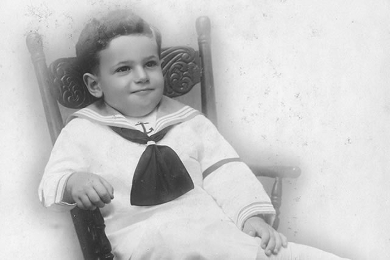
George Maduro: alumnus saved from oblivion
15 July 2016 was the hundredth anniversary of the birth of George Maduro, Leiden alumnus and namesake of Madurodam, a park in The Hague where visitors can see Holland in miniature. War-time and resistance hero Maduro died at the age of 28 in Dachau concentration camp. ‘A lot of the information we have about him isn't correct,' says his biographer Kathleen Brandt-Carey.
Wealthy family

George John Lionel Maduro was born on Curaçao, the son of a wealthy sephardic Jewish couple Joshua and Rebecca Levy Maduro, who were cousins. Father Maduro ran a flourishing and family business S.E.L. Maduro & Sons, a shipping company, on the island. The company still exists today. He was also very successful on the stock exchange. He was sent as a child to The Hague for his education: the last two classes of the junior school and then the Netherlands Lyceum in The Hague. Many of the studets would later study in Leiden or become Engelandvaarders, including Erik Hazelhoff Rolfzema, the 'Soldier of Orange'. In 1934 Maduro wen to study Law in Leiden.
Military Willems medal
Maduro earned his bachelor's degree but did not manage to complete his studies, much to the disappointment of his parents, not to mention himself. There seemed to be a curse on his graduation: first he was called up for military service and then he became ill. Then his professor of ivil Law, Meijers, was dismissed, followed by a ban on Jewish students being educated. And finally, the university was closed down. Maduro had just six more months to go, but it siply didn't work out.
When war broke out in May 1940, Maduro was stationed in The Hague as a reserve officer. Under his leadership Villa Dorrepaal, a strategic location in Leidschendam that had temporarily been occupied by the Germans, was recaptured. In 1946 he was awarded the military Willems medal posthumously. After the surrender, Maduro was imprisoned but was released again ten days later. He became a member of an illegal organisation of officers allied to the Ordedienst who carried out sabotage operations and maintained contact with England.
Betrayed and arrested

In February 1941 Maduro went into hiding, often, somewhat dangerously, appearing without the Star of David. In May 1941 he was arrested because he was thought to know something about a shooting incident involving two soldiers under his command. At least that was the reason given. In reality, it was a ploy to extract money from him. He was imprisoned in the so-called Oranjehotel prison in Scheveningen. After seven and a half months he was released. In 1943 Maduro and his best friend decided to sail to England from Spain to join the allies. However, they were betrayed and were arrested in Belgium. They were then imprisoned in Saarbrugge (now Saarbrücken) in Germany, where Maduro spent fourteen months, after which he was sent to Dachau. He died there on 8 February 1945, a few months before the camp was liberated by the Americans.
The Netherlands in miniature
Maduro's parents received only sporadic information about their son during the war. It was in June 1945 that they heard that he had died. In his memory they donated a sum of money and their family name for the construction of Madurodam, a miniature village in The Hague.
Biography
American author Kathleen Brandt-Carey wrote the biography Ridder zonder vrees of blaam about Maduro. The book was published on 15 July.
How did you come across George Maduro?
‘I am married to a Dutch man and I have lived here since 1980. In 2014 an American aunt, a niece of George Maduro, asked me to buy a couple of books about Maduro in Madurodam. She didn't know George herself, but she had met his sister and parents. The books were not in stock and so I decided to look up some information on internet. The webtexts that I found contained contradictory information. I started to do some searches and consulted primary sources to check things out. What I found prompted me to write Maduro's biography.'
Did you find many contradictions?

‘I did. Maduro didn't actually escape twice, as it says in Wikipedia. He was released twice! And that he was supposed to have helped parachutists to escape via Spain is also completely untrue. The Ordedienst had nothing to do with parachutists. And the wrong date was often given for his death: 9 February, while according to the records from Dachau the correct date is 8 February. I made extensive studies in archives in the Netherlands and Germany. I went to Curaçao, and to the US where I was able to check out the Maduro family archive, where there were a lot of letters. That was how I managed to find all the right information. It would be a great project for a student of communications to explore how so much rubbish about Maduro can find its way online.'
Have you spoken to anyone who actually knew Maduro?
‘Yes, I spoke to five or six people. One was a woman who was the youngest sister in a family where Maduro was in hiding. And, with a young lady of just 101, who had been at school with Maduro and who later also joined the Resistance. She worked at a fashion school, where she provided him with a hiding place.'
Maduro was not famous at that time, you say…
‘When he was a student, he was a member of Minerva. There was one time when Minerva students, led by Maduro, stole as a trophy a figurehead from a navy ship, the so-called Loden Verrader, that according to Maduro belonged to his family. as a trophy. It was reported in all the newspapers. There was a lot of publicity, too, when Maduro recaptured the Dorrepaal.’
What kind of a man was Maduro, besides being courageous?
‘He was cautious rather than reckless. But he was also a kind man, gentle, friendly and charming. He was very good-looking, as well, which meant he was popular with the ladies. The lady of 101 said that he was even more handsome in real life than in the photos.’
You wrote the biography in two years. That's very quick.
‘I would have liked another year, but Maduro's 100th birthday is a good opportunity to present the book. Madurodam is very pleased with it. The three nephews that I spoke to have come over to the Netherlands for the occasion. You also keep on finding out more information. A biography is never actually finished.’
(CH)
 Ridder zonder vrees of blaam; het leven van George Maduro 1916-1945
Ridder zonder vrees of blaam; het leven van George Maduro 1916-1945
Kathleen Brandt-Carey
Uitgeverij Spectrum
424 pages
€ 24.99
Also available in English, under the title:
Knight Without Fear and Beyond Reproach
The translation from English to Dutch is by Constanteyn Roelofs, a Leiden alumnus of history.
